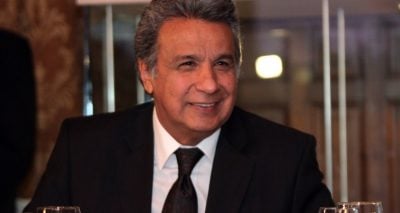Police State Ecuador Under Lenin Moreno

Moreno campaigned on a platform of continuing the progressive policies of his predecessor Rafael Correa.
Straightaway in office, he betrayed the public trust. Ecuadorian legal scholar Oswaldo Ruiz-Chiriboga accused him of abandoning his pledges, implementing neoliberal policies demanded by US and internal special interests, purging Correa loyalists from his regime, operating extrajudicially.
Moreno sold Julian Assange to the US and UK for $4.2 billion in loan shark of last resort IMF blood money — requiring force-fed austerity, serving bankers and other corporate interests at the expense of the public welfare he abandoned.
Ruling anti-democratically, he waged war on independent journalists, human rights activists, and individuals criticizing his regime.
Mass protests in the capital Quito and other Ecuadorian cities since October 3 continue over Moreno’s elimination of longstanding fuel subsidies and other harsh neoliberal policies — in deference to IMF diktats.
Protesters want fuel subsidies reinstated, austerity ended, a return to progressive rule instituted by Correa, Moreno’s resignation, and snap elections to replace him.
After 10 days of public outrage, police and other security forces killed at least five protesters, injured countless others, and arrested around 1,000 individuals — what police state repression is all about.
The Moreno regime unleashed state-sponsored viciousness, refusing to reinstate the fuel subsidy or soften his hardline neoliberal agenda.
Reportedly on Saturday, indigenous CONAIE leaders accepted his request to meet for direct talks — short of suggesting he’ll ease support for privileged interests exclusively at the expense of ordinary Ecuadorians.
He ordered a military-enforced curfew, starting at 3:00 PM Saturday, saying: “We’re going to restore order in all of Ecuador. We’re starting with the curfew in Quito” and surrounding areas.
Last Tuesday, he announced a curfew near government facilities, ports, bridges, and other so-called “strategic zones.”
Ecuador’s ombudsman Freddy Carrion slammed the curfew, calling it “a desperate attempt by (Moreno) that will only worsen the violence.”
Urging him to reinstate the fuel subsidy, he said “(i)t’s the only way to reduce violence” and curb public anger over his harsh agenda.
CONAIE official Leonidas Iza said conditions for talks include holding them publicly, broadcasting them on national television.
“We’re not going to talk behind closed doors,” he stressed. Talks “ha(ve) to be with the Ecuadorean people. There has to be large screens so every tiny input from our members can be heard” and seen.
CONAIE president Jaime Vargas urged Ecuadorian military officials to back legitimate demands of protesters against “the orders of that traitor, liar and thief” Moreno.
He falsely accused Correa and Venezuela’s Maduro of orchestrating a coup against his rule.
According to Ecuador’s energy ministry, protests curbed oil production. A copper mining company announced curtailment of its operations.
Ecuadorians want progressive rule enjoyed during a decade of Correa’s tenure reinstated.
Interviewed by Sputnik News, Correa said an “Ecuadorian press ‘wall’ supports Moreno. Ordinary people reject their one-sided coverage.
“The hegemonic press (operates as) Moreno’s greatest accomplice.” Since earlier military dictatorial rule, “I have not seen such cruel persecution with curfews, the abolition of constitutional guarantees and physical repression, beating protesters, dispersing demonstrations” violently, he said, adding:
Moreno is discredited, his rule at “an end. He is a puppet of lobbying groups.” Ordinary Ecuadorians no longer tolerate him.
“With his help, the elite has regained power based on fraud and treachery. What way out do I see? If he remains in office, he will become a bigger nobody even more than today.”
His regime “is already in a state of clinical death, in a vegetative state. Hegemonic media, business, financial power, the military, the police, and part of the church continue to support it.”
“Our democracy is made of playdough. (Power elites) control all the real branches of government, including the state institutions that they have taken over, for example, the Electoral Commission, to prevent me from participating in free elections. Nevertheless, I am being optimistic. I believe that we will win.”
Correa noted that throughout his decade in office, Ecuador prospered without IMF involvement.
Ordinary Ecuadorians yearn for governance enjoyed during his tenure. They want neoliberal harshness ended and Moreno replaced with new leadership, serving everyone in the country equitably.
*
Note to readers: please click the share buttons below. Forward this article to your email lists. Crosspost on your blog site, internet forums. etc.
Award-winning author Stephen Lendman lives in Chicago. He can be reached at [email protected]. He is a Research Associate of the Centre for Research on Globalization (CRG)
His new book as editor and contributor is titled “Flashpoint in Ukraine: US Drive for Hegemony Risks WW III.”
http://www.claritypress.com/LendmanIII.html
Visit his blog site at sjlendman.blogspot.com.
Featured image is from Grayzone Project

